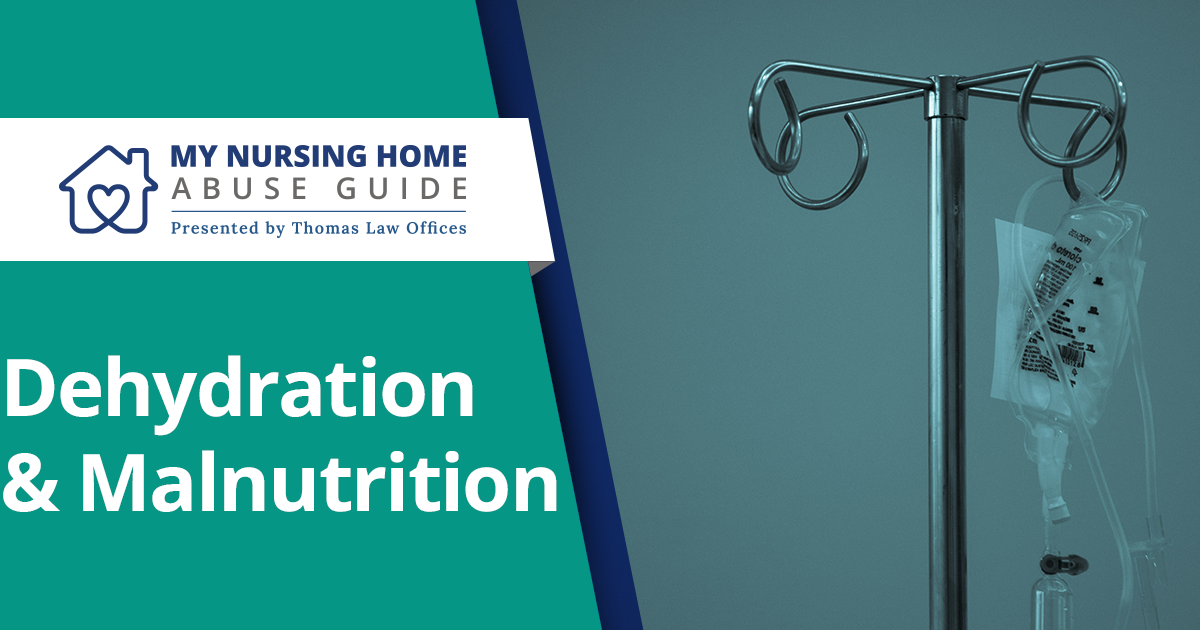Your Guide to Nursing Home Abuse & Prevention
Millions of elderly adults live in nursing home facilities.
Every one of them deserves to feel safe, protected, and respected.
Millions of elderly adults live in nursing home facilities.
Every one of them deserves to feel safe, protected, and respected.

Adequate water intake and properly balanced meals are important for all individuals to maintain a healthy, functioning body. When elderly adults don’t receive the right care (usually from their caretakers), it often results in dehydration and malnutrition in nursing homes.
In care facilities, this often occurs due to nursing home neglect, and even if such mistreatment is unintentional on the part of the caretakers, the effects on elderly residents can still be damaging.
Dehydration happens when you don’t drink enough water or lose water too quickly through sweating, vomiting, or diarrhea. Certain medications can cause increased urination, which raises the risk of dehydration.
Data from the National Library of Medicine (NLM) shows that adults aged 65 and older are at greater risk of suffering from dehydration because their bodies don’t hold as much water, and they can’t tell as easily when they’re thirsty.
Malnutrition occurs when your body is either not receiving or not retaining the right amount of nutrients to meet your body’s needs. Another NLM report shows that elderly adult who suffer from malnutrition are less likely to recover from its effects, greatly compromising their health.
In nursing homes, both dehydration and malnutrition are generally caused by caretakers neglecting their residents by not providing them with adequate amounts of or access to water and proper portions of healthy food. This often occurs when facilities are understaffed, and there are too many residents under the care of one caregiver, causing the caregiver not to have the time or energy to choose balanced meals or take sufficient care of each resident.
Although this type of neglect is usually unintentional, it can still cause serious problems and often results in these neglected nursing home residents developing illnesses or suffering from severe side effects.
Water is important for your body to function. It aids digestion, lubricates joints, balances your body’s chemicals, delivers oxygen throughout your body, and so much more. So, when your body doesn’t have enough water, it can cause health problems. Fortunately, the symptoms of dehydration are rather easy to notice:
More severe symptoms are:
Understanding the signs of dehydration is important, especially if you have a loved one in a nursing home or extended care facility. If you can recognize these signs, it greatly lessens the chances of your loved one suffering severe adverse effects of dehydration, as you will.
When we think of malnutrition, we usually envision children in third-world countries whose bones are prominent through their thin skin, but that’s not the only sign of a malnourished person. Depending on the type of malnutrition occurring, there are varying symptoms we might notice.
Undernutrition may look like:
Overnutrition may look like:
It is important to understand the different types of malnutrition and the varying signs and symptoms that coincide with improper intake of nutrients. Older nursing home residents often can’t speak up for themselves when it comes to their care, so it’s up to us to pay attention and ensure they are receiving sufficient food.
The effects of dehydration and malnutrition in nursing homes are often quite severe in elderly adults, especially those who already have other illnesses or health concerns. It’s pertinent to understand how this type of neglect can affect those who suffer from it and why we should quickly intercede on behalf of those showing signs and symptoms.
Dehydration can cause the following complications:
Malnutrition can cause these complications:
With the proper medical intervention, most of these complications may be reversible, but the effects may be long-lasting and quite damaging, especially in elderly adults.
As with any other type of elderly mistreatment in nursing homes or anywhere, it’s imperative to the health and safety of our loved ones that we pay attention to the quality and cleanliness of the nursing home itself and how the staff treat their residents.
One of the best things we can do is visit frequently and ask questions about their day and meals. If your loved one is unable or unwilling to speak about how much water they’ve had or the last meal they ate, talk to their caregivers or nursing home staff.
If you believe your loved one is dehydrated, malnourished, or suffering from any other form of neglect, there are ways to report nursing home abuse. There are also options available to you if you choose to pursue legal action after confirming the presence of dehydration and malnutrition in nursing homes.
The well-being of all nursing home residents should be a priority, and we are the ones who can speak and act on behalf of our older loved ones, the most vulnerable population.
This website was created and is maintained by the legal team at Thomas Law Offices. Our attorneys are experienced in a wide variety of nursing home abuse and neglect cases and represent clients on a nationwide level. Call us or fill out the form to the right to tell us about your potential case. We will get back to you as quickly as possible.
866-351-2504